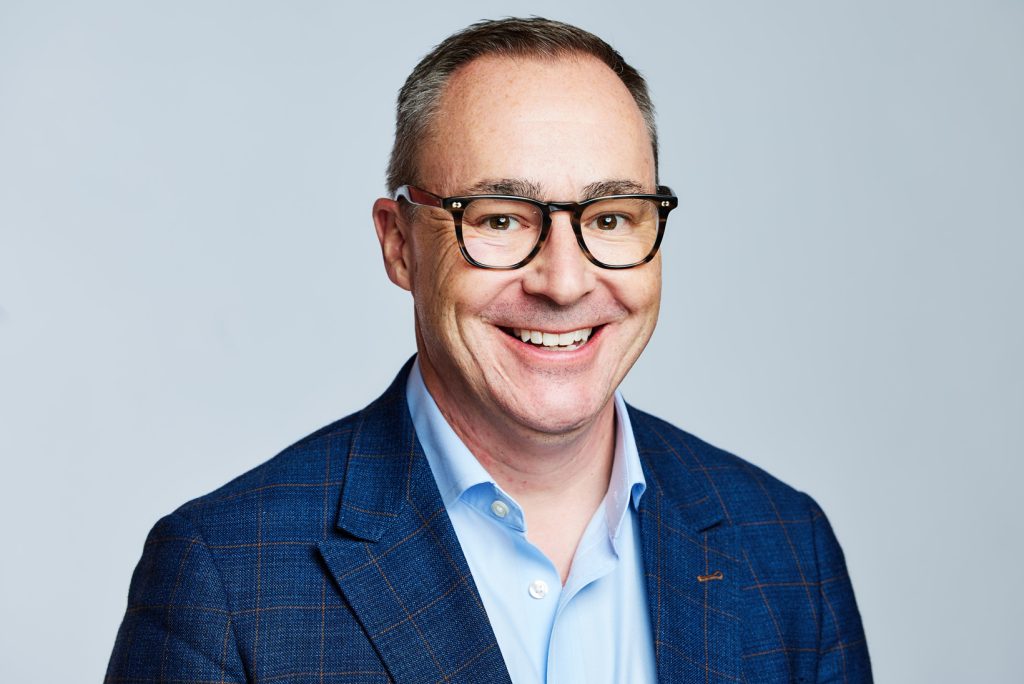February 28, 2024
After completing his first leadership exercise with a healthy dose of honesty and a natural sense of intrigue, Phil Goldie recalled waiting for the word cloud to generate.
That headline moment designed to capture the very essence of you as an influential executive, a label which can offer insight and explanation in equal measure.
The word cloud generated… ‘calmness’ – more than 20 years of experience whittled down into eight letters.
“I remember being hugely disappointed,” Goldie admitted. “It’s not particularly dynamic and naturally, I wanted ‘dynamism’, ‘thought leader’ or something along those lines.”

Injecting a refreshing sense of transparency into the conversation, Goldie quickly came to learn that was actually a positive, an invaluable attribute in such a turbulent market.
“That’s what people value of me,” he said. “In a chaotic environment, I can be calm. I’m not going to add value by not being that but if what you need is calm, then I can be calm.”
The flip side of that can be urgency however. Do measured leaders insert enough immediacy into situations when they have a natural inclination to remain cool-headed?
“Don’t confuse calmness for a lack of urgency,” Goldie clarified, speaking as Vice President and Managing Director of Australia and New Zealand (A/NZ) at Okta. “Being able to articulate your style and how people experience you is very important.”
Goldie comes out almost at the end of the extreme introvert scale on a Myers Briggs Assessment – the “most profound” learning he has experienced about how he processes information in over two decades of occupying executive leadership roles in the UK, Australia and New Zealand.
“I’m a huge introvert,” he added. “I’ve learned a lot in my career about how I manage my time and my energy and one is that I tend to make decisions on my own.
“Not as in I decide on my own but I’ll usually consume a lot of information and discussion, then take that away and process it. Once I tapped into that, it became a very powerful thing to understand about myself.”
Translated into day-to-day work, that means Sydney-based Goldie has lots of conversations as a “big believer” in creating a shared understanding of a problem. Time is methodically spent ensuring teams understand the right problem – “and we understand it clearly” – to ensure the group holds the same view from the outset.
“We hire smart people who can fix pretty much anything but if we don’t understand the problem, we tend to make mistakes,” he advised. “That’s why wallowing more and being more patient in getting to a decision suits me better.”
In that context, Goldie’s preference is to network and have a range of discussions to pick up nuggets of information from colleagues, customers, partners or the industry in general. No agenda, rather a take on the current climate to help shape thinking on a particular issue.
“If we’re talking about trying to improve something, we’ll have that discussion but then I’ll spend time away talking, listening, reading and thinking around the issue,” he added. “That external perspective is also very important.”
Whether in life or in business, the lazy – and incorrect assumption – to make is that introverts are shy and submissive, often avoiding any form of social engagement or interaction. Bill Gates is an introvert, so is Warren Buffet, Larry Page and Mark Zuckerberg.
On the flip side, extroverts are stereotypically defined as expressive – perhaps even aggressive – as well as outgoing and energetic. Bill Clinton is an extrovert, as was Steve Jobs and Muhammad Ali.
“This is less about confidence, rather where you get your energy from,” Goldie noted. “I’ve done the standing on stage addressing 2000 people many times and I’m perfectly comfortable doing that, it’s an important clarification to make.”
As an introvert leader, Goldie replenishes energy when alone unlike extroverts who thrive on having people around them as a source of fuel.
“I’m very comfortable in all-hands and conferences but what I’ve learned is that those environments are quite draining for me,” he acknowledged. “Not in a negative way, rather that once I’ve finished one of those sessions, I shouldn’t do a one-on-one with someone because my energy will be lower. That’s the classic introvert vs. extrovert definition.”
By that definition, Goldie can’t change who he is and nor should he – in the same way that extroverts should also embrace their own attributes.
“Being aware is one of the biggest learning moments in my career,” Goldie said. “Figuring out who I really am is one part, but then it was about figuring out how to operate very effectively as an introvert.”
Punch ‘what type of leader am I?’ into the search bar and Google will return 1.85 billion results within 0.32 seconds – an endless supply of tests and quizzes carrying various degrees of credibility.
There’s no shortage of leadership exercises taking place across the market on a daily basis but those character judgements don’t all convert into action.
This isn’t about which trait is right or wrong for leadership, rather the value in understanding who you are as a leader. But as Goldie attested, understanding your make-up is one thing, acting accordingly is another matter entirely.
“Be honest and open with the team about how they’ll experience you as a leader,” he said. “These tests helped me articulate those things to my team.”
New role, same identity
Joining Okta in May 2022 came with the remit of defining an emerging digital identity market on both sides of the Tasman, spearheaded by an expanding customer and partner base.
Prior to this, Goldie spent 12 years at Microsoft in a range of leadership roles spanning sales, partner and marketing – most recently as Director of Small, Medium and Corporate. This was in addition to six years at Nortel at the start of his career.
In stepping out of Microsoft – a behemoth in terms of market size and stature – Goldie is now exposed to a different level of scrutiny as commander-in-chief of a region.
“100% – I feel it every day,” Goldie said.
“In leaving a place like Microsoft where I’d worked for 12 years, I was 100% convinced that joining Okta was the right decision. There’s never been a day that I’ve looked back and questioned that.”

Despite such conviction, Goldie accepted that it took a period of time between leaving Microsoft and joining Okta to fully grasp his value as a newly appointed country leader. The buck now stops with him.
“This will sound like a pun but yes, what’s actually my identity?” Goldie questioned. “How much of what I achieved was actually me? How much of that was being in the right place, at the right time, at a company like Microsoft?”
Goldie spent a lot of time pondering those core questions:
“You wouldn’t be human if you didn’t wake up every day and have those questions in your mind,” Goldie shared. “Looking back some 20 months on from that, there’s now less questions in my mind because of the good amount of success that we’ve delivered as a team.”
For Goldie, joining Okta was never a case of “am I making the right decision?” rather “am I clear on my identity?”
Demonstrating this level of humility – and vulnerability – is rare in a market still moving away from archaic impressions of what leadership looks like. But Goldie has self-awareness in spades, backed by a steely resolve and understanding of what truly makes him tick as a high-performing executive.
“Did I feel a need to change my identity in this new role? Maybe a little but it wasn’t a case of, ‘we want this version of you, could you be that?’ instead,” Goldie clarified. “Leadership is all about authenticity and people follow people that they believe are genuine.”
And Goldie has the battle scars to prove it, having made this mistake “plenty of times” in his accomplished career so far.
“In the past when I’ve pivoted between sales, channel and marketing type roles, I’ve made the error of thinking, ‘okay, I’m moving into this position so I need to somehow be different’,” he shared. “You need different skills and you learn that along the way but who you are and how you show up has to be one of the most consistent things – the most valuable thing.”
Also, a natural point exists mentally when comparisons to previous employers and methods of working must stop.
“You do it because that’s your big reference point about how things should be done but you must lose the habit of verbalising that,” Goldie said. “Think about it, ‘at Microsoft this or at Microsoft that’ is not interesting or helpful to people.”
Instead, Goldie viewed this as tapping into information that would be useful in the moment and with context. The art of the transition is picking your moment, if a moment even exists.
“Okta is a fast growth company with less resource compared to Microsoft so it can be quite exhausting for people if you’re constantly demanding that things should be done in a previous way,” he outlined. “Sometimes my past experience is applicable, other times it isn’t.”
Making a career-defining decision
In long and deliberate discussions with Steven Worrall – Managing Director of A/NZ at Microsoft – about future aspirations, Goldie started the process of outlining his next career steps.
But that wasn’t an easy choice – “it’s not as if I was trying to get out of something that wasn’t enjoyable, that definitely wasn’t the case.”
Having joined the company in early 2010, Goldie’s timing was almost perfect. Arriving in the months after the Windows 7 launch, this was a vendor back on track and finding its groove – amplified by the appointment of Satya Nadella as CEO in 2014 and the transition to cloud.
“There was a lot of huge foundational shifts and before I even thought about leaving, it was important to reflect that I couldn’t have spent 12 years in a better place in terms of my own career and development,” Goldie said.
“It was a fantastic place to work and I say that working for a company that now competes with Microsoft. As a culture, a place to learn and an innovator – I believe it’s probably without parallel.”
That was the context in which Goldie was weighing up his options, which centred on three key considerations.
Personal in the sense that relocating outside of Australia wasn’t an option for Goldie, his wife and three children. Having already moved to New Zealand for two years between 2017 and 2019, options existed to advance into Singapore or the US but that wasn’t a priority.
“I remember the day we talked about that because we’d kicked that can down the road for many years,” Goldie recalled. “But if I got a job offer tomorrow and we had to all jump on a plane and go, would we go? The answer was not right now.
“Some could look at that as limiting and discounting opportunity but we found it liberating as a family. That helped clarify what I really wanted to focus on.”
From an impact standpoint, this was based on learnings from Worrall as a passionate leader who cared about taking the capabilities and assets of a large technology company to help solve ongoing problems in Australia.
“How do we put our company to work?” Goldie said.
Yes, job one is to absolutely make the number and grow the business. But a “bigger and broader” purpose exists with regards to how a vendor can help a nation – whether that be Okta or Microsoft.
“Having an impact beyond just selling projects is important,” he noted. “As a migrant to this country 21 years ago, that grounded me back in Australia as a country.”

Impact always comes with responsibility however. Looking back on a “very clear period” in his career at Microsoft, Goldie recalled having lots of ideas about what impact the business should be doing more broadly beyond the sales number.
“But I was accountable for that and we were missing the number,” he cautioned. “A mentor internally said, ‘all of that other stuff is only valued if you’re actually delivering the results’ and that’s why I’m very clear that job one is to drive success.
“I don’t see them as being mutually exclusive because the sales leadership component offers a starting point upon which to build.”
The third consideration was from a professional standpoint and what Goldie – who is more of a podcast listener than voracious reader – wanted to experience during the next phase of his career.
For a long time, careers have been viewed as linear professions moving towards bigger and better things, translating into more money, better job titles and increased responsibility.
“That has absolute value, of course,” Goldie said. “But I was 47 when I left Microsoft and I asked myself, do I want to do these types of roles for maybe 10 more years?”
Then a mentor injected… “change the way you think about this, don’t focus on 10 years as the same continuation and progression – that’s probably two or three jobs.”
That was when Goldie’s perspective switched. What two or three jobs do you want to spend the rest of your working life actually doing? When framed that way, the options look different.
“But don’t think of them as jobs, reframe it to projects and ways to have an impact,” Goldie expanded.
“It sounds a little high purpose but it was pretty profound and influenced my thinking. Do I really care about the titles those roles have or the perceived seniority? Versus the environments that would be interesting and deliver the outcomes that I want to deliver?”
So, if you only have three jobs left… write the three jobs down and go and find them. In addition to a Board Member role at the Children’s Medical Research Institute (CMRI), that translated into experience working in a:
At this stage, it was less about jobs and companies.
“Okta is just good fun, that’s the word I use most consistently to describe it,” Goldie said. “Not every day and not every thing but in aggregate, it’s just good fun.”
This is a fast-paced business with less than 6,000 employees globally, creating gaps in-between roles in which positions can be extended and different avenues of interest pursued.
“Gaps are good,” Goldie added. “It’s not quite choose your own adventure but you can certainly take any role here and define how big that scope is and the impact you want to have. That’s proven to be true for my role.”
Advancing the digital identity conversation
A key part of the interview process was Goldie examining to what extent that Okta – as a market-leading digital identity platform for businesses – needed a sales leader or country manager?
“Those two roles are quite different,” he explained.
Certain companies seek certain qualities at certain times with Goldie under the sharp understanding that job number one was simple – drive a successful business. In addition to that however, a broader skill set and way of thinking was also valued.
“Okta was a good fit for that,” he said. “This is a unique opportunity given how huge digital identity is becoming in Australia”
According to recent Okta findings – Secure Sign-In Trends Report – the use of multi-factor authentication (MFA) has nearly doubled since 2020 with phishing-resistant authenticators considered the leading choice in terms of security and convenience for users.
In Australia, the government is currently exploring legislation in this area supported by work from Victor Dominello and the Tech Council of Australia among others.
“There’s a lot of industry focus which was part of the bet in joining Okta,” Goldie added. “This creates a business opportunity to sell into but also a platform to participate in that discussion.
“These are complex problems and as a vendor, we’re in a position to help solve those problems while providing a voice that can help steer the thinking about what should be done at a systems level across the country.”
Looking ahead, Goldie said Okta will continue to become “more vocal” in the local market around this issue – not as a public relations exercise but to apply the business in a way capable of supporting national efforts.
Building industry influence won’t start and stop with Goldie however, with the wider leadership team embarking on purposeful and subtle ways to drive the agenda forward.
“An example of our thinking is around bringing more interns into Okta,” Goldie detailed. “Many of the universities in this country are huge customers of Okta so we’re exploring those partnerships and linking conversations togethers.”
Whatever the outcome in 2024 and beyond, Goldie is guided by the key question of… “how do we put our company to work?”
Inform your opinion with executive guidance, in-depth analysis and business commentary.